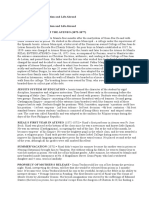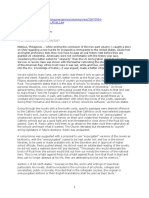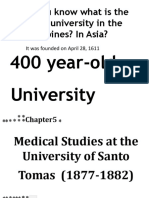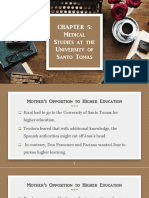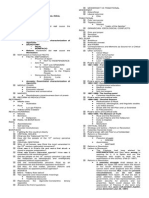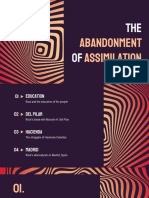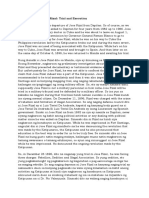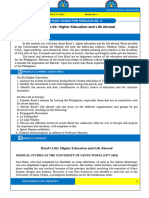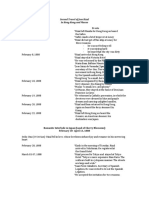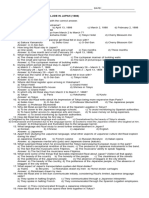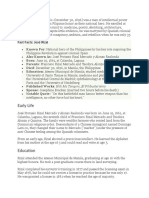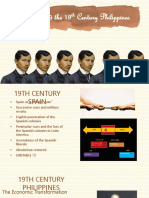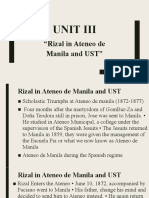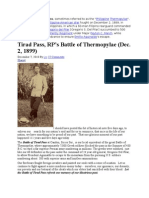0 ratings0% found this document useful (0 votes)
413 views214 pagesRIZAL by Austin Coates
Uploaded by
Matt Russell YusonCopyright
© © All Rights Reserved
We take content rights seriously. If you suspect this is your content, claim it here.
Available Formats
Download as PDF or read online on Scribd
0 ratings0% found this document useful (0 votes)
413 views214 pagesRIZAL by Austin Coates
Uploaded by
Matt Russell YusonCopyright
© © All Rights Reserved
We take content rights seriously. If you suspect this is your content, claim it here.
Available Formats
Download as PDF or read online on Scribd
You are on page 1/ 214
RIZAL
Philippine Nationalist and Martyr
The Author
In 1950, being at the time Assistant Colonial Secretary in Hongkong,
‘Austin Coates made a study of Rizal's 1891-92 stay in the colony,
interviewing people who had known Rizal or had memories of
him. The author was a guest of the Philippine Government at the
International Congress on Rizal, held at Manila in 1961. This biog-
raphy was written during 1964-67. Born in London in 1922, son of
the composer Eric Coates, he combined the early part of his writing
career with work as an administrator, diplomat, and advisor on
Chinese affairs, leaving government service in 1962. He is a Knight
Grand Officer of the Order of Rizal, Philippines, and a Fellow of
the Royal Asiatic Society, London.
José Rizal
Madsid 0,
RIZAL
Philippine Nationalist and Martyr
BY
AUSTIN COATES
SOLIDARIDAD PUBLISHING HOUSE
531 Padre Faura
Ermita, Manila
p-65460
Reprinted and Exclusively Distributed by
Solidaridad Publishing House
531 Padre Faura
Ermita, Manila
Philippine Copyright, 1992
Solidaridad Publishing House
Copyright © 1992 by Solidaridad Publishing House
‘This reprint has been authorized by Oxford University Press
for sale in the Philippines only and not for export therefrom
© Oxford University Press 1968
ISBN 971-536-1323,
Contents
List of Illustrations Page
Inteoduction
i
I
YOUTH IN MEDIEVAL TWILIGHT
1861-1882
Childhood in Calamba
‘The Frailocracy
Student of the Jesuits
University of Santo Tomés
Departure on a Mission
Wr
JOURNEY INTO LIGHT
1882-1887
‘The Impact of the West
. First Year in Madrid
. ‘The Toasting Speech
Final Year in Madrid
Ophthalmic Studies in Paris and Heidelberg.
Fulfilment in Berlin
Noli Me Tangere and Departure from Europe
mr
THE STORM BREAKS
1887-1888
Return to the Twilight
"The German Doctor’
Furore
30
40
3
65
n
or
99
106
119
130
138
wv
STRUGGLE, DARKNESS, AND ACHIEVEMENT
1888-1891
1. Pacific Route to England
1, London—the Propaganda Movement
1 Literary Undertakings
2 Correspondence with Spain
3 Correspondence with the Philippines
4 Over the Channel
uit, Paris and Morga’s Sucesos
1v, Brussels—the Anatomy of Sacrifice
vy. Conflict in Madrid
vi. Biarritz Interlude
vu, El Filibusterismo, Resignation, and Exit
v
ON THE EVE
1891-1852
1. Hongkong—'the Spanish Doctor’
1m. Visit to Sandakan
ut. Preparation for Death
1v. Hero's Return, Arrest, and Deportation
vI
‘THE DEFERMENT
1892-1896
1. Dapitan and the Jesuits
1. Scientific Works and School at Talisay
tt Josephine Bracken
vu
‘THE SIGNATURE OF DEATH
1896
1. Revolution
u, Trial
it, Ultimo Adiés, 29-30 December
wv. The Good Opportunity
y, An Aftermath of Controversy
Conclusion
Acknowledgments and Bibliography
Index
Maps
East Asia, showing the position of the Philippines
‘The Philippines, showing places connected with the
life of Rizal
283
294
308,
337
332
349)
363
379
The monogram on the title page was drawn by Rizal, and is
reproduced by permission of the National Library, Manila.
Illustrations
José Rizal, Madrid, 1890 frontispiece
Francisco Mercado facing p30
Teodora Alonso 30
The Mercado family home at Calamba 31
Portraits of Rizal, between 1872 and 1883 46
conor Rivera 7
6 Paciano Rizal Mercado 78
7 Narcisa Rizal-Lépez 7%
Juan Luna, Rizal and Valentin Ventura in Paris ey
josephine Bracken 4
Ferdinand Blumentrtt, 1888 8
Ferdinand Blumentritt, 1910 95
Rudolph Virchow 95
‘The manuscript cover of Noli Me Tangere 158
Rizal in A Play Staged at the Ateneo de Manila 159
W. E, Retana 174
Reinhold Rost 174
Gertrude Beckett 175
Nelly Boustead 15
Rizal, Marcelo del Pilar and Mariano Ponce, Paris 1889 286
Lotter from Rizal to Blumentritt, 5 July 1890 287
Josephine Bracken 287
Rizal's cell in Fort Santiago 302
‘The alcohol burner 302
Ultimo Adiés, the last page 303
Introduction
But 1am constant as the northern star,
Of whose truc-fix'd and resting quality
"There is no fellow in the firmament.
Julius Caesar, Act i, Se.
‘Will my fate be that of water,
never to be lost in nothingness?
José Riza,
Heidelberg, 6 August 1886
‘TweRe WAS to be public execution, and consequently: the
secets and buildings were bung with flags. A day of execution
wos a fiesta
Since first light a crowd of many thousands had been gather
ing on the broad greensward facing the sea—gentlemen in
poater hats and smart drill suits, with their ladies clad in their
best, the hems of their long skirts dampened a little here and
there by the dew which still lay on the grass.
Tt seas the tropics’ apology for winter, the start of another
swarm blue day, cloudless and still with at morning and evening
‘ry slight chill in the air, such as there was now. The sun had
siready risen on the landward side, and as the minutes drew
towards 7 am, the multitudinous voices of the crowd were
hnished. The beat of an approaching drum announced the arrival
of the condemned man.
‘The Europeans had the best vantage places, and being in
general taller than the local people they tended to monopolize
the view. Despite this disadvantage, however, a fairly large
number of local people had come as well—men and women,
the well-to-do, the fashionably europeanized, the prudent—to
join their European masters in uttering patriotic cheers. For
the death to be witnessed on this fine morning was the death of
traitor, and not merely of a traitor but of the arch-traitor,
described by the military judge who had tried him as ‘the
principal organizer and living soul of the insurrection’.
For four months the country had been gripped by revolution,
It had not yet succeeded in penetrating the capital, but in the
countryside there were widespread disturbances which the
Europeans had hitherto been unable to suppress. With the
ative in the country, his execution afforded a salutary oppor
tunity of showing the natives where they stood. Today might
ll prove to be a turning point, Thus the exhilarated atmos-
INTRODUCTION
phere, The date was 30 December 1896. The place was 8
pea, the extensive public park in the heart of Manil
capital of the Spanish Philippines.
The crowd was 50 dense, and there was so muck jockeyit
for postion, that police arrangements broke down and
prisoners ailtary escort, which should have been behind bi
Pad to form fle on either side of him, forcing its way throu
to the execution ground. Within the fairly wide corridor
space thus created, what remained of the procession was 2
seamove through the mass of people with reasonable dignit
First came the drummer. After him, flanked by two tall Spanis
Jesuits in black souzanes and shovel-hats, came the lesser figut
of the traitor.
‘Aged thirty-five, short and slender, pale after two months
prison, he was impeccably dressed in European style, black wu
Epotlessly white shirt and tie, and wearing a black derby by
seitch in vogue at that time in Europe, His appearance wasalmot
English in its formality and taste, But it was not tis that deg
people's attention. Te was his features and expression, and
Botmm dignity of his bearing. As could be seen at a glance,
Seas no ordinary traitor to be jeered and howled at. AS he p
There was silence, while people stared, some in surprise, other
snith concern, and all with the uneasy sense of being confront
by something they did not fully understand.
‘Most people have a preconceived idea of what a traitor lod
like, It is natural to expect to detect features of malevoler
or duplicity, o defiance, the wild stare of a misplaced visiona
or the grimace of a swashbuckler who has lost out. About
{itor there was nothing that could be preconceived. To beg
‘ith, his was an arrestingly interesting face. Apart from know
that he was a man of the Far East, it would have been difficu}
to define him racially, All that could have been said—and th
‘only by an astute observer—was that he was from one of 1
countries of South-East Asia, and bore indications of 1 part
Malay, partly Chinese ancestry. Yet there was nothing
hhim of the withdrawn Oriental, that character beloved of
European imagination. His eyes, wide-spaced, thoughtful,
‘compelling in their truthfulness, came out to meet whomer
ENTRODUCTION
they looked at, as European eyes do. He bad very li
Bo ee eel atte
frm chin and perceptive lips, could be sensed at ance a mental
finity to Europe, expressed through an Asian physique. This
Gas aman who had passed far beyond diflerences of race and
ution. Despite being a member of a subject race, it was the
fice of a person the equal of any, expressive of intellectual
honesty and insight, both in unusual measure. As the Madrid
newspaper reports of the oceasion show, there were few Span-
fbnds present that day who, once they had seen him, remained
tinaware of these qualities, disconcerting as they found them.
The umpression the pale young man conveyed was inescapable.
The escort forced a way through to the cleared rectangle of
cas, lined by troops, which was to be the place of execution,
When the traitor had been conducted to the seaward end, in
which direction the shot was to be fied, there was some
discussion inaudible to bystanders, ‘Then those nearest to the
trator drew back, the preparatory commands were barked out,
tnd in the second of silence before the final order to fire, while
people excitedly eraned over the shoulders of others fora glimpse
ole scene, the ton fly audible sid in de, xy
ois, ‘Contemerton ef? wie t
The command, ‘The shot. People being pushed forward upon
others in the surge to view the body. A curious silenee. ‘The
orgunized cheer ofthe troops. The lead given tothe release of
motion, And following this, the public cheers, the cheers, the
"The living soul of the insurrection was dead
As so often happens in the case of public cheering they were
cheers illtimed. The shot which that crowd had just heard was,
the shot which br anish empire it
th sex which brought the Spanish expire in the Philipines
The situation in the Philippines on 30 December 1896 was
‘catively simple, The insurgents had few ams and no source
of ammunition. The Spaniards hed adequate military and naval
forces to deal with the insurrection provided the government
continued to enjoy a certain measure of Filipino public support.
pxTRODUCTION
‘This last was important for mainly geographical reasons. TI
Philippines, a complex archipelago of more than seven thousan
islands, with in those days only very limited inter-island com:
munications, presented singular obstacles to an_outrightl
rnilitary control." Each well-populated island, even today, isi
a sense a small country on its own, requiring a complete appa:
‘atus of government distinct from its neighbours. At that tim
outright military control offered a commander the choi
between a dispersal of his forces so extensive and disconnecte
that in effect they ceased to be a unitary army, or concentratior
of force in various population centres, lesser islands being left
in the balance of popular goodwill. In December 1896 the
Spanish military administration was in the process of regroupi
from the former to the latter.
Nor was goodwill entirely lacking—the goodwill, or possibly
just the prudence, of such as came to witness the execution a
cheer. But within days of 30 December on Luzon, the mai
northern and ‘capital’ island, and within weeks throughout t
entire Philippines, this situation changed, Ds. José Rizal, dl
young ophthalmic surgeon who had been executed that day
‘was regarded by educated Filipinos as a genius, the architect an
embodiment of theit country's aspirations. By the unedueat
‘he was regarded more simply as a kind of demi-god. By all
‘was recognized as the greatest Filipino who had ever liv
He was also, ironically, the most understanding, patient, an
influential friend Spain possessed in the Islands.
Day after day following 30 December other victims wer
brought forth from the torture chambers of Fort Santiago to b
‘executed in public. It was the dry season; stains were
‘washed away by rain, From end to end the grass of the Lune
‘was brown with dried human blood.
But all these deaths, terrible as they were, did not make t
same impact as did the execution of the young surgeon. Fort
Spain had killed him, of all people, showed to every Filip
from one end of the country to the other that Spain was bli
to their needs, deaf to their pleas, and contemptuous of th
“The length ofthe archipelago from north to south s equivalent to
sistas to Morence Sram, or om London to angie.
xviii
INTRODUCTION
claim to be treated as the equal of other human beings,
gp pallet cere ice acces a a
as though they themselves had been unforgivably insulted; and
3 produced revulsion against the tnmentor It was ¢naion-
wide reaction which words could not express, deeply and
Secretly fei le vee ten ple pes
vital to the maintenance of the Spanish position, fell away. Even
the prudent who had turned up to cheer found there was
prudence in not being pro-Spanish, to be so having become in
effect treasonable in « Filipino.
From that moment Spanish rule was doomed. The death
agony took another eighteen months, but in effect on 30 Decem-
ber 1896, by a single shot, Spain erected her own sepulchre in
advance of the demise
A scant shaft of hope might have remained, though it would
probably have dane no more than prolong the death agony,
could further substantial military reinforcements have been
obtained. But these were not forthcoming. Spain at this time
‘vas simultaneously endeavouring to suppress two insurrections
on different sides of the globe, one in the Philippines, the other
in Cuba. Because of greater Spanish public interest in Cuba,
because of the island’s closeness to the United States, and
because of the aggressive trend of American public opinion,
strongly reflected in Congress, toward the continued Spanish
presence in the Caribbean, Spain, when torn between the equally
urgent demands of two of her overseas ‘province’, decided that
the suppression of the Cuban revolt must be given priority.
Besides which, the Spanish Government underestimated the
‘capacity of the Filipinos to wage rebellion with any measure of
success. Spain in fact tended to underestimate the Filipinos in
coehing. This was basally wat the Plppine rel was
When the Governor and Captain-General ofthe Philippines
(Geviaal Cath rruvige: tied tat le easel eee
ments were virtually ignored, he resigned his command in
April 1897. Under his successor, General Primo de Rivera, the
Tebela were at last forced into reteat. But here the Spanish
INTRODUCTION
successes were partly due to dissension among the Filipino
leaders.
“The actual organizer and first leader of the rebellion was
Andres Bonifaeio, a young, cool and determined idealist, capable
‘of inspiring men to follow him, yet who, as rebellion spread
from town to town, found that not every tovin loyal to his cause
accepted his leadership. Furthermore, boldly attempting objec-
tives which were beyond the capacity of his forces, he suffered
inital reverses, thereby incurring the criticism of being inade-
{quate a8 a military commander, In this capacity the outstanding
man thrown into prominence by the events of revolution was
Emilio Aguinaldo, who, operating from bases in Cavite province,
‘obtained numerous military successes against the Spaniards
‘At a meeting of the revolutionary leaders in March 1897
‘Aguinaldo was elected to direct the struggle in succession t0
Bonifacio, without whom there would have been no revolt
Bonifacio, bitterly disillusioned by the perfidy of those whom
be had regarded as his colleagues, cut loose with a number of
men still loyal to him, refusing to acknowledge Aguinalda’s
leadership.
“The Spaniards were quick to take advantage ofthis favourable
situation. As factionalism spread among the Filipino people,
some loyal to Bonifacio, others to Aguinaldo, the rebel position
became desperate, On 10 May 1897 Bonifacio, on Aguinaldo’s
orders, was tracked down and shot. But this scarcely improved
‘matters; the rebels continued to retreat. By this time they had
litde or no arms and ammunition; most of them fought with
knives and staves; but they proved themselves able guerrilla
fighters and had the great advantage of enjoying the support of
the population. At the end of the year it was recognized on both
2 Jone Alejandrino, sevclutionary general and a balanced observer of
events supported this questiontble action Ina letter tb Fesdinand Blumen
{St dited 11 My 8p, be wrotes Agunaldo snot only good army man
but slsos good ruler 4s he succonded, despite the seri diaension® that
Broke atthe rank off vn ie aout the ny af
fhe diferent elements of whicn te Hverators of the Palippunes ae comporcd
Sometimes he made use of penceful means, while in other instances be
esoTed to cnefgetic measures when circumstances warranted theit Use”
‘Glad Jose Alejandrino, La Souda del Sacre; trans. Jose M. Alejand-
fine, The Price of Freedom, +945,
INTRODUCTION
des that it was stalemate, the Filipinos unable to prevail, the
Spaniards unable to suppress them. Primo de Rivera and
wainaldo signed a truce, the latter going into voluntary exile
jn Hongkong.
"The truce settled nothing, Rebel outbreaks continued,
sporadically and becoming increasingly serious; and thus it
ould undoubtedly have continued for years had not an extra-
yrcous event lifted the struggle from being a remote colonial
ifr, suddenly placing it on the stage of world history
In February 1898 the United States battleship Maine blew
up in Havana harbour. The explosion was almost certainly
accidental, but the American public, going through a most
1! period of warmongering sentiment, inflamed by public
ation over events in Cuba, was in no mood to treat it as,
h. In stentorian terms the disaster was condemned as an
Of Spanish treachery. On 19 April resolutions were intro-
duced into Congeess demanding the independence of Cuba and
the despatch of American forces to aid the Cuban rebels.
Unwsisely Spain, instead of temporizing, accepted the challenge,
and made a fatal declaration of war on the United States
Tt was what Washington had been waiting for. With almost
unseemly speed orders were sent to American naval commanders
to attack Spain at her two most sensitive points, Cuba and the
Philippines. On 1 May 1898 an American squadron under the
command of Commodore George Dewey entered Manila Bay,
and without the loss of a man destroyed the entire Spanish fleet
off Cavite. A similar disaster overtook the Spanish flet in Cuba,
Dewey then had to await the arrival of land forces to complete
the Spanish defeat. With his agreement Aguinaldo returned to
the Philippines, the Americans giving every outward indication
of their intention that the country should become independent.
With this encouragement, on 12 June 1898 the Filipinos declared
their independence, Emilio Aguinaldo becoming President of
\what is now known as the First Philippine Republic. One of
the frst acts of the Republic was to declare 30 December a day
of rest and reflexion in memory of Rizal, a commemoration
hich despite every vicissitude hes been observed ever since
xxi
INTRODUCTION
In the military ficld mopping-up operations proceeded swifll
under Aguinaldo's direction. Within @ matter of wecks 1
only Spanish forces left in Luzon were penned in Manila at
‘Cavite, the two towns being cut off from one another. As
reinforcement of American troops, Aguinaldo hoped, and
country would be totally free.
‘Tt was a miscalculation, In July the land forces Dewey need
began to arrive, and the Americans moved to the accomplis
‘ment of their real design, which had nothing whatever to do wit
Philippine independence. For the United States had caught tl
prevailing great power disease, and had resolved to embark up
empire. Secret negotiations were entered into between Dewey a
the Spanish authorities, and on 13 August, an agreed date, aft
a face-saving exchange of fire, American forces entered Manil
from the citadel of which the colours of Spain were lowered fa
ever. The Filipino forces, waiting for a signal to enter the cit
swere ordered by the Americans to remain outside. Only then di
‘Aguinaldo realize that he and his men had been dupes in aw
game and by no means a simple one, since had the America
not taken Manila, the Germans, with the requisite forces poi
and afloat in the China Sea, would certainly have done so inst
‘At the time of the peace negotiations, held in Paris, Aguinal
made despairing efforts to obtain international recognition
Philippine independence; his representatives were not
titted to the conference room. It is at this point that can
seen at its clearest the significance of that execution two y
carfier, and the importance of the complete psychologi
estrangement of the Filipinos from Spain which it produc
Had Rizal been alive in 1898 he would unquestionably: ha
rallied Philippine sympathy for defeated Spain, thus placing
exceedingly complex obstacle to the realization of America
imperial ambitions. The United States would doubtless, int
‘mood of that time, have acquired some form of favoured posit
‘or tutelage in the Philippines, but it could never have been i
the extreme form it actually took, As it was, the Filipis
friends of neither the United States nor Spain, found themselv
diplomatically isolated, their leader reduced in international ey‘
to the status of a bandit chief.
INTRODUCTION
In December 1898, by the Treaty of Paris, the Philippines
were declared to be American territory. For two years Aguinaldo
commanded a military struggle against American forces in the
Jslands, but one by one his principal officers were captured, and
in March 1901 he himself was taken, bringing his Republic to
an end. On 4 July that year, with the inauguration of American
Civil government, the Philippines became, in effect if not in
raine, a colony of the United States of America.
‘The Americans, quick to discover the political and literary
‘works of Rizal, and to appreciate the immense esteem in which
the as held by his countrymen, recognized in him an invaluable
link between the Spanish period end their own that had sueceed-
cd it. To many Americans it seemed that Rizal’s aims and their
‘own were one, On 7 April 1903 President Theodore Roosevelt,
speaking at Fargo, North Dakota, went so far as to say
In the Philippine Islands the American government has tried, and is
ing, to carry out exactly what the greatest genius and most revered
ot ever known in the Philippines, José Rizal, steadfastly ade
ocated.
With the coming of the Americans twentieth-century ait
blew into the Islands. ‘The new rulers quickly rid the country
of the Catholic ecclesiastical rule under which it had suffered
solong, Successive changes of President in Washington, coupled
With the lack of an equivalent to the British India Office or
Colonial Office as a means of ensuring continuity of policy,
rendcred the complete fulfilment of Theodore Roosevelt's aim
{ess impressive than its enunciation; but in a leisurely way, and
With increased momentum between the two world wars, the
Americans introduced various measures of internal self-govern-
‘ment which would almost surely have led to complete independ-
ence, This leisurely trend of affairs was brought to an abrupt
fend in December 1941, when Japan, as part of her aim to
‘stablish a Greater East Asia Co-Prosperity Sphere, invaded
the Philippines and subjected the country to a rule of tyranny
2nd barbarism arousing universal detestation. In the last months
ref C84 by Austin Cra, Lineage, Life and Labors of José Rival, Manila,
INTRODUCTION
of hostilities, in 1944-5) the Japanese mounted a desperate
Struggle against the returning Americans, and Manila was
fought steect by stcet. Asa result t was a war-ravaged country
swith much of its eapital city in ruins which on 4 July 1946 was
Jecorded independence by the United States, an unsatisfactory
independence, but onc on which both sides at that time were
determined |
The ceremony took place on the Luuneta; and as President
Truman's special emissary read the deed of independence,
ihe did so before the statue of Rizal, which that day witnessed,
ton behalf of the man himself che fulfilment of one of the main
purposes of his life's work.
Outside his own country Rizal is chiefly known forthe poem
hho wrote in the death cell on the eve of his exceution, and which
vray smuggled out of Fort Santiago hidden in an alechel burner.
"The poctn was written on small slip of paper and it was nether
titled, nor dated, nor signed. It has come to be knovin as the
Citimo Adiés, and holds an assured plac: inthe Spanish literature
ofthe period, It istobefound in numerous anthologiesof Spanish
Verse ond—in Spanish or in translation—in every anthology
Of the poetry of patriotism worthy of the name. The poem,
feven in translation, gave its author international recognition
‘he a poem of patriotism it is distinguished by a complete
absence of jingoism, or scorn for enemies, or the appeals to glory
Svhich too often make this kind of verse tedious; and in that it
fells the exact circumstances in which it was witten, it has a
powerful human appeal, Here is a man condemned to die for
fhe cause of his country, and in the final hours before dawn,
twhen he will beled forth to execution, writing his last farewell
to country, family and friends. Like all poems, it suffers in
‘translation. In Spanish the compulsion of its message and the
flow of the lines, some af which are of exceptional felicity and
sonority, combine to make it, in its genre, a poem of particular
distinction, This is to treat it in its Spanish contest, In its
‘feian context—and itis after all an Asian poemm—it is unique
in quality and in the nobleness of its expression. Among all the
ExTRODUCTION
corse in whatever language inspired by the Asian independence
Jovements there is nothing that can be compared with it.
In his own country Rizal is revered as a national hero, and
js known for a mass of other writings, in particular for his two
ovis of contemporary Philippine life, Noli Me Tangere and
bl Filibusteriomo, which are taught in all colleges. His place in
his country’s history has also been fully assessed. He was the
tan who single-handed awakened the Philippine people to
tutional and politcal consciousness, an extraordinary achieve-
trent which will he examined in what follows
Yt im the panorama of Asian history in the nineteenth and
twentieth centuries his position is less clear, and in need of
definition
At the time of his birth, European power and influence in
Asin had been growing and spreading for more than three
hhsdeed years; but forthe most part his was a slow, haphazard
« its principal motivation being trade. The Indian Mutiny
4:57 matks the end of this long epoch in Europe's relations
‘sith Asia, From 1858 onwards a new determination and energy
infused European activity in the East, and with this came a new
principle, the territorial acquisition of empire, still principally
{or purposes of trade, but also with the aim of bringing Western
forms of government and education to peoples whom the West
considered to be either barbarous or decadent, or both. During
this period, from 1838 to 19e0—almost the exact period of
Rizal’s life;—Britain consolidated her power throughout the
Indian sub-continent, added Burma to her empire, and by
means of protectorates extended her influence to embrace
Malays, Sarawak and Sabah (North Borneo). Vietnam, Laos
and Cambodia were absorbed by France, Japan was drawn out
of her long seclusion, and Thailand signed her first treaties with
Western nations. Ceylon was already ruled by Britain, Indonesia
by the Netherlands, and the Philippines by Spain, China, rent
by internal rebellion and misruled by the tottering Manchu
dynasty, managed to maintain a semblance of independence;
bu by 1898 every port of any usefulness on the China coast was
funcr European control. The last decade of the nineteenth
Jesmsury dawned on an Orient which had become a suburb of
INTRODUCTION
INTRODUCTION
and nations must be regarded by Europe as equals, an idea
whch tthe Europe colonial power of that tins was in
Vusying degrees pretentious, preposterous, or abhorrent.
“The Philippine Revolution of 1896, which Rizal's works
inspired but which he was in fact opposed to, knowing it to be
premature and inadequately organized, was the frst genuinely
ational revolt by an Asian people against a colonial power.
‘That it was genuinely national in character was due entirely to
Rizal, the first exponent of Asian nationalism, -
‘His execution was reported in newspapers throughout the
‘world, In most countries the fact that Spain had felt obliged
to execute, as leader of the rebellion, a 35-year-old doctor, a
rman of peace and evidently a person of some local distinction,
shoséed simply that there was something rorten in the state of
the Spanish Philippines. But this came as no surprise. It was
‘what most intelligent readers would have assured
In Asia reaction was more acute. Since the establishment of
Buropean power, the sentient minority in each country of the
East had become absorbed in a phase of critical self-examination,
which atthe yearn, pac Deame, ineningly widepread
The power and efficiency of Europe had at this time induced
state of affairs in which everything from the West was assumed
tobe superior. In the last two decades of the nineteenth century
contrary voices were heard, challenging this assumption, In
Ind che of ie exist ene ef change overs Behe
Absningranath Tagore rok company with dhe Indian atts
wo for more than fifty yeas had been uninspiredlyéitating
uropean styles, and launched out into a distinetive style of his
own, inspired by Indian sources. In China the first modera
scolars had the temerity to desare thatthe philosophy and
aod ais of China were every whit as valableas thos of Europe
inaugurating the ra later tobe personified philsophy by
iu Shik and in painting by Ch’i Pai-shih, both of whom
invested old forms with a new vitality.
qbatin the poi field there was hesitancy. The East which
1 Europeans had overpowered had been a world of kings
Burope, The real capitals of East Asia were London, Pari
‘Amowrdam, and Madrid. In the entire vast area lying bet
Guluchistan’ and the islands of the Pacific, only Japan
Thailand precariously maintained a status independent oft
direct or indirect European control prevailing everywhere el
Ti was precisely this same period which gave birth to the
who by their lives and works were to render it impossible f
wetonialisin and Western exploitation to take a long lease on 1
Orient, OF these men four great individuals stand pre-emine
Mohandas Karamchand Gandhi, Rabindranath Tagore, St
‘Yat-sen, and José Rizal. All four were born within a few
jf cach other; Rizal and Tagore were born in the same ye4
$6r, Sun Yat-sen in 1866, and Gandhi in 1869. All fo
Tpeovbed deeply the new learning of the West, and broug!
Wenternctrained intellect to bear upon the problems of Asi
IAll four challenged and questioned the West in the West's o
jerme, a process which invigorated a largely supine contin«
tea ultimately-—because the West could understand what t
said, and it hurt—sapped the self-confidence of the colons
powers, who tll then had believed in the supreme rightness
their misson, Between them these four men, aided and emulat
by others, created a new climate of thought in Asia tending
the inevitable attrition of colonialism, 2 movement to which
colonial powers themselves inadvertently contributed by 1
jnvasions of 1941. When the Japanese were finally thrust ba
into their own islands, the climate of thougbt the four men
‘created dominated Asia completely, and the colonial pow
self-confidence, despite their victory, had evaporated.
(Of the four men Rizal, though the least known, is in
ways the most remarkable. OF an. extreme sensibility,
political ideas matured at an unusually early age. Long
Tagore was anything other than a critical acceptant of Brit
rule in India, when Sun Yat-sen was a student and G:
just a schoolboy, Rizal was enunciating clearly, in sper
‘published articles and letters, the eoncepts, entirely his
‘Of a new and completely different relationship between Bur
‘and Asia—the relationship of today—in which Asian p " Absnindracath ‘Tagore (1874-1981), nephew ofthe poet Rebindramth
INTRODUCTION
whose subjects had been their feudal property, to be elevat
chastened, or conseribed for war at w
‘come new ideas, of nationhood and individual rights, but wi
‘caste, clan and regional differences to be reckoned with
‘was difficult to see what application these new ideas co
have in Asia, The word nation had entered many vocabulari
there was a desire among the sentient that theie countries
become nations in the Western sense. But few were certain
such desires were not academic dreams, so remote from achi
ment did they seem in the social context of the Bast. T!
hesitancy is exemplified in India in the degree to which
country’s earliest political institutions owed their origin
British initiative and their membership to British support.
‘Alone among Asian countries, Japan after the Meiji Resto
tion of 1868 had transformed herself into a nation on Euroy
lines, above all armed with European weapons, which the ¥«
before Rizal's death had been used with effect in the Si
Japanese War. But an aggressive nationhood such as Japan
‘was not exactly what the rest of Asia sought. Furthermore Jap:
hhad for many centuries been a country unified under one gover
‘ment; the transposition from the feudal to the modern was
this extent less complex than in countries such as India, unifi
by a colonizing power but traditionally divided.
‘The Philippines on the other hand, prior to the Spani
occupation, had had a background more related to that of I
and South-East Asia, Historical research suggested that
Islands had once been part of Further India, with rajas, Hind
style courts, and Sanskritic writing. It was thus presumed to
‘a country with problems of national adaptation similar to tho
of India, the largest and most significant of the Asian natiot
subject to European rule.
In India, which was awakening politically in advance of
neighbours, it was the national aspect of the Philippine rebellio
an aspect which Rizal as a Western-trained doctor seemed
aptly to typify
rebellion were remote, the Philippines being separated from
rest of Asia by the twin barriers of distance and the Spani
language. But Rizal's death gave the revolt dramatic public
. With the West hi
the nineteenth century, perhaps of any A
Brapher can scarcely be accused of exaggeration in saying that
thece are times when it seems as if everything his subject ever
‘83, id, wrote or thought in his shor life hus been recorded
which attracted attention. The events of 1
INTRODUCTION
and the message it conveyed was clear. ‘Those few in each
subjected country who had dared to dream of a future day when
European power would be overthrown saw that they were not
alone. There were others. They might speak other languages, and
{nliabit countries little known; but in their reactions to colonial
rule they were kin, For the radical it became possible cautiously
to believe, for the first time, that to entertain the idea of putting
an end t0 European supremacy was to be in tune with one
of those movements that inexplicably sweep across continents,
Abore all, the national character of the Philippine revolt, a
character which the unsuccessful struggle for independence
against the Americans between 1898 and 1901 served to confirm,
signalized what till then had been regarded by many Asian
intellectuals with doubt: that the East's feudal kingdoms and
principalities, expunged or emasculated by the colonial powers,
\were capable of reshaping themselves as modern nations under
their own national leaders.
The revolt failed. The colonial epoch moved unconcernedly
oon, But it was not forgotten, and among the discerning, neither
was Rizal or what he stood for. To Asia's growing number of
nationalists the events of 1896 in the Philippines became a land-
tmark, a conclusion held increasingly as, under the Americans,
the Philippines switched from Spanish to English, and more
information became available concerning the rebellion and its
nature. Gandhi spoke of Rizal asa forerunner and asa martyr in
the cause of freedom, and Nehru, in his prison letters to his
daughter Indira, recognized the significance of the growth of
Philippine nationalism and, if inaccurately, Rizal’s part in it.
Though the revolt failed, the idea of modern nationhood as a
Practical possibility in Asia had been born. This was due to
Rizal, and constitutes his place in history.
Rizal's is the most highly documented life of any Asian of
ever. His bio-
You might also like
- A. Ocampo - The Fight Over The Rizal LawNo ratings yetA. Ocampo - The Fight Over The Rizal Law2 pages
- Medical Studies at University of Santo TomasNo ratings yetMedical Studies at University of Santo Tomas43 pages
- Quibuyen's - A Nation Aborted (Summary-Notes)100% (1)Quibuyen's - A Nation Aborted (Summary-Notes)5 pages
- Life and Works of Rizal Zaide Chapter 1 5 SummariesNo ratings yetLife and Works of Rizal Zaide Chapter 1 5 Summaries33 pages
- The Last Days of Jose Rizal: Trial and ExecutionNo ratings yetThe Last Days of Jose Rizal: Trial and Execution4 pages
- Rizal's Life: April Joyce Galang ReporterNo ratings yetRizal's Life: April Joyce Galang Reporter39 pages
- Module 4 Higher Education and Life AbroadNo ratings yetModule 4 Higher Education and Life Abroad31 pages
- Travels in Asia: The Life and Works of Jose RizalNo ratings yetTravels in Asia: The Life and Works of Jose Rizal8 pages
- Chapter 12-Romantic Interlude in Japan (1888)No ratings yetChapter 12-Romantic Interlude in Japan (1888)2 pages
- Biography of José Rizal, National Hero of The PhilippinesNo ratings yetBiography of José Rizal, National Hero of The Philippines4 pages
- Chapter 21 Second Homecoming and The Liga FilipinaNo ratings yetChapter 21 Second Homecoming and The Liga Filipina35 pages
- The Life and Works of Rizal Chapter 3 - 20240902 - 113838 - 0000No ratings yetThe Life and Works of Rizal Chapter 3 - 20240902 - 113838 - 000025 pages
- Rizal's Exiled, Trial, Retraction, and Execution PDFNo ratings yetRizal's Exiled, Trial, Retraction, and Execution PDF51 pages
- PI 21 Chapter 6-Rizal's Second Travels and Homecoming PDFNo ratings yetPI 21 Chapter 6-Rizal's Second Travels and Homecoming PDF14 pages
- Life and Works of Rizal Rizal'S Annotation of Antonio Morga'S "Sucesos de Las Isla Filipina" and Philippine NationalismNo ratings yetLife and Works of Rizal Rizal'S Annotation of Antonio Morga'S "Sucesos de Las Isla Filipina" and Philippine Nationalism6 pages
- Week 7 First Homecoming To Sidetrip To The UsaNo ratings yetWeek 7 First Homecoming To Sidetrip To The Usa26 pages
- Rizal's Life: Exile, Trial and ExecutionNo ratings yetRizal's Life: Exile, Trial and Execution15 pages
- Unit Iii: "Rizal in Ateneo de Manila and UST"No ratings yetUnit Iii: "Rizal in Ateneo de Manila and UST"28 pages
- Chapter 3 - Early Education in Calamba and BiñanNo ratings yetChapter 3 - Early Education in Calamba and Biñan13 pages
- Midterm Module in The Life and Works of RizalNo ratings yetMidterm Module in The Life and Works of Rizal38 pages
